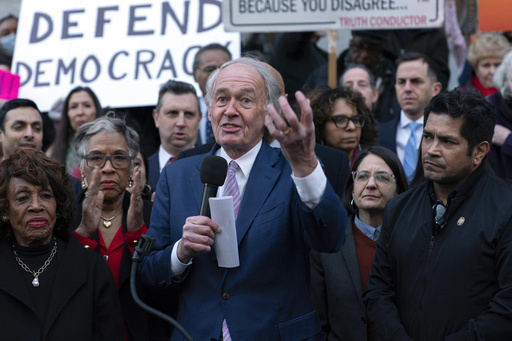WASHINGTON — Recently, Elon Musk unveiled the Department of Government Efficiency at the Capitol, prompting House Speaker Mike Johnson to express enthusiasm over the transformative changes expected from the Trump administration.
Three weeks into this administration, the changes have escalated into a massive disruption of the federal government’s operations. Long-established programs have been dismantled, inciting a strong public backlash and raising questions regarding Congress’s role in law-making and budgetary responsibilities.
Federal employees are facing pressure to resign, entire agencies are being shut down, and funding to states and nonprofits has been temporarily suspended. Furthermore, sensitive information from the Treasury Department was made accessible to Musk’s DOGE team, resulting in a significant breach of privacy protocols.
“This is an erosion of our democracy,” remarked Brian Riedl, a veteran economic advisor to conservative circles who is now affiliated with the Manhattan Institute.
President Donald Trump has appointed Musk, recognized as the wealthiest individual globally, to re-engineer the functions of America’s longstanding democratic structure. Thus far, the results have been both remarkable and alarming, facing challenges through numerous lawsuits across the country.
Congress appears to be struggling to contend with the advances of DOGE, as wary lawmakers observe its progress through the governmental landscape. A multitude of lawsuits is emerging to curb the Trump administration’s unilateral actions to dismantle federal operations, compounded by widespread protests outside government offices.
“Whatever DOGE is doing, it is certainly not — not — what democracy looks like or has ever looked like in this country’s grand history,” stated Senate Democratic leader Chuck Schumer, criticizing the developments.
In response to Schumer’s comments, Musk asserted on his social media platform, “Hysterical reactions like this is how you know that DOGE is doing work that truly matters.”
Congress has encountered similar scenarios in the past, particularly during Trump’s initial term, where he disregarded established norms and navigated legal boundaries, notably by redirecting military housing and construction funds for border wall projects.
In his second term, Trump’s alliance with Musk, who significantly financed Trump’s presidential campaign, is intensifying these confrontations. The duo’s stated goal is to locate and eliminate government inefficiencies, but their actions pose a threat to fundamental institutions and civil service structures.
Sharon Parrott, president of the Center on Budget and Policy Priorities, warned that if this initiative succeeds, it could result in “catastrophe for our governmental system.”
“Many of their actions are egregiously unlawful, and the courts have shown they are prepared to act swiftly,” she commented, recognizing the significance of the situation.
Trump is, in many respects, enforcing what Republicans have long withdrawn from achieving through legislative measures: diminishing the scale and influence of the federal government. Political figure Grover Norquist once humorously proposed the notion of reducing government size to the extent that it could be submerged in a bathtub.
Due to internal party resistance to cutting essential programs, Republicans have repeatedly encountered hurdles in their budget objectives—even when controlling both Congress and the presidency, as they do presently.
While Congress holds the authority to legislate funding for government initiatives, the president can either veto or sign bills. Instead, Trump is experimenting with a concept endorsed by his budget director nominee, Russ Vought, who claims that the executive branch has the power to “impound” federal funds, effectively retracting previously approved allocations.
Republican Senator Kevin Cramer of North Dakota mentioned that DOGE provides certain Republicans with justification for reducing federal budgets, particularly in instances where Congress has failed to act.
Other Republicans have expressed contentment with Trump halting specific federal functions, especially the U.S. Agency for International Development, with the Department of Education potentially being next in line for closure.
“We’ve got oversight,” remarked Republican Senator Thom Tillis of North Carolina. “If he goes too far, I’ll be the first person to step up.”
Collectively, the actions undertaken by the Trump administration and DOGE have been rapid and pervasive, sparking significant debate.
A sudden freeze on federal grants and loans by Trump’s Office of Management and Budget provoked outrage, causing anxiety among states and non-profit entities reliant on these resources for vital services. Following widespread dissent, the White House quickly reversed this decision.
The funding halt to USAID is perceived as an experiment to test the Impoundment Control Act, a legislative framework Vought has previously referenced in relation to reversing congressional funding decisions. Vought’s nomination remains on track for Senate approval this week, despite a unanimous opposition from Senate Democrats.
Moreover, DOGE gained access to the Treasury Department’s payment systems, tapping into personal data of millions, perceived as a strategic move for the White House to potentially cease federal funding allocations.
On Monday, U.S. District Judge Loren L. AliKhan stated that the administration’s funding practices could “potentially run roughshod over a ‘bulwark of the Constitution’ by interfering with Congress’s appropriation powers.”
“Defendants’ actions appear to suffer from infirmities of a constitutional magnitude,” she stated, extending a previous order that had halted the sweeping funding freeze. “The appropriation of the government’s resources is reserved for Congress, not the Executive Branch. A wealth of legal authority supports this fundamental separation of powers.”
Senator Patty Murray of Washington, who serves as the top Democrat on the Senate Appropriations Committee, expressed concern over how Congress will proceed with upcoming legislation aimed at funding the government by the approaching March 14 deadline.
“What if we accomplish all that and reach an agreement … only for this administration to dismiss it?” she pondered. “The trust level here is at its lowest point in my experience.”
When questioned about the administration’s authority to pursue these actions, Speaker Johnson acknowledged, “There will be an appropriate action for Congress to take, but we haven’t yet sorted out what’s happening.”
Pressed further on whether Trump held the power to shutter agencies, he responded, “I don’t have all the answers.”
